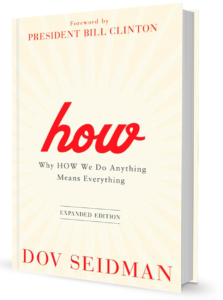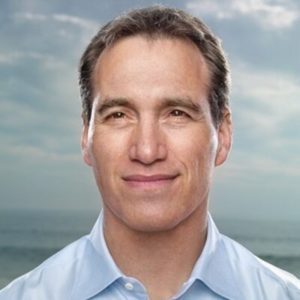How
How we think, how we behave, how we lead, and how we govern are some of the “hows” that are the subject of Dov Seidman’s book, How: Why How We Do Anything Means Everything.
It’s a thoughtful book, not the type to read in one sitting, but one filled with experience and perspective that will change the way you think about the world and your role in it.
Dov Seidman is the founder and CEO of LRN, an organization that helps companies navigate complex legal and regulatory environments and build ethical corporate cultures. He was also named one of the “Top 60 Global Thinkers of the Last Decade” by Economic Times.
What inspired you to update and release this new version of How?
When HOW first appeared, I argued that we were entering what I called the Era of Behavior. I felt compelled to update and enhance HOW because since then, it has become clear that we haven’t just entered the Era of Behavior. We’re way deep in it. Our behavior matters even more than I thought when I wrote the book, and in ways I never imagined.
Our world is not just rapidly changing, it has been dramatically reshaped. We’ve gone from being connected to interconnected to globally interdependent. Technology is bringing strangers into intimate proximity at an accelerated pace, affording us richer experiences, but also demanding new levels of empathy and understanding. These same technologies are granting us MRI vision into the innermost workings of traditionally opaque organizations and even into the mindsets and attitudes of their leaders. We’re now living in a no-distance world where our moral imagination has exploded.
To thrive in this reshaped world, how we behave, lead, govern, operate, consume, engender trust in our relationships, and relate to others matter more than ever and in ways they never have before.
Leadership Lessons from the Wave
What leadership lessons can be drawn from “The Wave?”
An act like The Wave is such a perfect metaphor for the style of leadership we need today. At its core, leadership is about how we get people to act and to join us. When you think about it, there are really only three ways to do this. You can Coerce, Motivate or Inspire. Coercion and motivation, threatening with sticks or bribing with carrots, come from without and happen to you. Inspiration, however, comes from within. When people make a wave in a stadium, what makes them express themselves by standing up out there is what comes from inside. In business, what inspires others to join in waves is the sense that they are on a journey worthy of their loyalty that embodies their deeply held beliefs and ideals.
Further, if you consider the Wave as a process of human endeavor, you realize immediately that anyone can start one—an enthusiastic soccer mom, four drunken guys with jellyroll bellies, or eight adolescents who idolize the team’s star player. You don’t have to be the owner of the stadium, the richest or most powerful person there, or even a paid professional like Krazy George Henderson, the Oakland Athletics cheerleader who invented the Wave in 1981. No one takes out their business card and says, “My title is the biggest; let the Wave start with me.” Anyone can start a Wave; it is a truly democratic act.
The world is more intertwined than ever before. How does – or should — this realization impact leaders today?
I think most leaders understand that we’re living in a reshaped world. And you don’t have to be a leader to see that in a short time, we’ve gone from connected to interconnected to globally interdependent. But the consequences of this change carry special import for people in positions of authority because the same forces reshaping our world are disrupting leadership itself. So the question for leaders becomes, “How are you going to lead effectively and meaningfully when all the old assumptions and frameworks have been upended?”
Right now, we’re experiencing an assault on the very foundations of our society, truth and trust – an assault that has led to a full-blown crisis of authority itself.
What leaders need to do in response is build moral authority. Leaders with moral authority understand what they can demand of others and what they must inspire in them. They also understand that formal authority can be won or seized, but moral authority has to be earned every day by how they lead. And we don’t have enough of these leaders.
How do leaders build, wield, sustain and not erode moral authority? They trust people with the truth – however bright or dark. They’re animated by values – especially humility – and principles of probity, so they do the right things, especially when they’re difficult or unpopular. And they enlist people in noble purposes and onto journeys worthy of their dedication.
How Matters More Now than Ever
“How” matters more than ever. Why?
It goes back to the forces that are reshaping our newly interdependent world. Social media has given us MRI vision into the innermost workings of traditionally opaque organizations and institutions. Technology give strangers intimate proximity to our lives, affording us rich experiences but also creating instability and cultural clashes. And the disappearance of distance has brought us closer to the aspirations, hopes, frustrations and plights of others in direct, visceral and unprecedented ways.
As it applies to business, it’s getting harder for organizations and individuals to succeed just on the basis of what they produce or the services they provide. But there is one area where tremendous variation and variability still exist. There is one place that we have not yet analyzed, quantified, systematized, or commoditized. One that, in many important respects, cannot be commoditized or copied: the realm of human behavior – how we do what we do.
The Power of the Pause
Talk about the power of the pause. What is it and why is it so important?
Think of the way we communicate. In the industrial age, we wrote letters deliberately, knowing that even if we dashed off a quick note from point A it would take its own sweet postal time to arrive at point B. The recipient, in turn, could take a commensurate amount of time crafting a response. The pace of information flow allowed enough time for even time-sensitive writing to receive at least a modicum of consideration.
Not so today. The overwhelming speed of almost every aspect of our lives runs counter to virtues we value — like patience, thoughtfulness and sound judgment.
That’s why the pause is so important. With a machine, hitting the pause button stops the action. But if you’re a human being, that’s when you start. You pause to make sense of your situation and to reconnect with your deepest beliefs. For business leaders, you pause to consider the fundamental issues that led your company down its current path and to its present challenges. Imagine how many of our mistakes could have been avoided, or how many missed opportunities we could have seized, if we had paused before springing to action.
You’re a CEO, but you also raise questions about capitalism. Tell us about your perspective of the current version of the capitalist system.
Capitalist enterprise is one of the most powerful and promising forces the world has ever known. Capitalism gives us the freedom to pursue our dreams and be our best selves through competition. No other economic system does that. At the same time, there’s widespread acknowledgement of the need to reform if not to rethink – and then fix – the current version of capitalism. We stand in a moment in time where capitalism is recognized as, at once, both indispensable and deeply broken.
 In this reshaped world, winners are winning by even larger margins, while those on the losing end are now realizing just how much they are losing. In a world that is so disorienting, it’s natural that people are looking for something to cling to, a foundation upon which they can find sure footing and build better, more sustainable bonds with others.
In this reshaped world, winners are winning by even larger margins, while those on the losing end are now realizing just how much they are losing. In a world that is so disorienting, it’s natural that people are looking for something to cling to, a foundation upon which they can find sure footing and build better, more sustainable bonds with others.
It’s why the movement around corporate purpose is so encouraging. Everywhere you turn—in marketing campaigns, in CEO speeches and TV appearances, and in articles in just about every business publication you can imagine—we are hearing about the central importance of corporate purpose in today’s economic world. Some are even claiming that we now live and work in a “purpose economy.” For business leaders, it has never been more essential—and consequential—to know who you are, what your business stands for, and have both of those elements animate and inform every decision you make. For me, this is the single most important factor in sustaining and strengthening capitalism in the 21st century – in a way that allows it to keep giving us the freedom we cherish.
Competitive advantage has shifted to how we do what we do. How does a company “out-behave the competition”?
By putting HOW at the center of everything you do. Leaders in twentieth-century capitalist enterprises historically differentiated themselves by WHAT they did. I call it Innovating in What. The market provided great incentives and protections to Innovate in What.
It is harder now to Innovate in What. It takes a lot of luck and money to be a pioneer, and even if you pull it off, the ability for someone to reverse engineer you in six months and instead of six years eliminates a lot of the incentive for doing so. Now, the great opportunity is to outbehave the competition, which means what really matters is HOW we do WHAT we do.
The term outbehave is not found in dictionaries, unlike outperform, outfox, outsmart, outmaneuver, outproduce, and so on. Language is important because it shapes our thinking. These terms are in the dictionary because they express common habits of mind and behavior. The idea that we can excel in our behavior and that principled behavior can be a source of advantage does not yet have a word for it. We’re like bodybuilders who rip their arms and torsos but ignore their legs. We have become top-heavy. We know how to outspend and outsmart our rivals, but we know relatively little about how to outbehave them. Figuratively speaking, it’s time to hit the gym and work on the behavioral legs that will both ground and propel us to more meaningful and sustainable lives.
Create an Ethical Organizational Culture
How do leaders best create an ethical organizational culture?
Businesspeople have systematized many things: HRIS, TQM, CRM, safety, Six Sigma, ERP. We need to systematize our “hows”: create the kind of human operating system that maps to 21st-century realities.
The human operating system comprises all the behaviors of an organization. It has three basic elements, all of which need to change in most companies. The first is governance: the policies, controls, rules, org charts, goals, and objectives that represent the formal structures of the organization. The second is culture: the values, principles, habits, mind-sets, history, lore, and legends that influence how people behave. And third is the leadership model. How do you lead? Is it through command and control, or connect and collaborate? Are you transparent, or do you share information only on a “need to know” basis?
Once you have focused on these areas individually, you have to fit them together into a single system. Are your governance, culture, and leadership models fighting or reinforcing one another?
Trust is a big theme in this book. What are the elements of an organization where trust is part of the culture?
We tend to trust people who get their HOWs right, people who are transparent, forthcoming, open, and honest; who share credit and opportunity with us; and who communicate fully, build strong interpersonal synapses, and keep their promises. In short, people with integrity. They collaborate, they embrace, and they engage. If you want trust, you need to find people and companies that create circles of trust around themselves. Like the Olympic rings, the more interlocking circles within a stadium, the more Waves you can make there. We live in a time when trust is the currency of the age. Trust is more valuable than ever before, so you should produce a lot of it. Those who can engender and wield more trust will win.
And yet, while business has long known about the benefits of trust, we often misunderstand how it works. If we have just met, and I choose to extend you my trust, who is virtuous: Is it me for trusting you or you for being trustworthy? Aristotle said that the one who extends trust is virtuous. When I trust you (even though I’ve just met you), I’m giving you the power to let me down or do right by me. I’m the one who’s vulnerable, who takes the risk. Trusting, in a sense, means giving something away and ceding power to others—an essential step in achieving the outward focus needed in a hyperconnected world. Trust empowers others but, because it is a virtue, it also empowers one’s self.
What are some of the ways that leaders torpedo trust?
Trust is destroyed by the suspicion that any person, group of people, or organization is acting in its own narrow interests without regard for mutuality and mutual advantage. This is especially true for leaders.
A leader who inspires trust must be the first and strongest follower of the ideals she espouses. When leaders fail to live up to their own stated values, they’re announcing that they can’t be trusted.
For more information, see How: Why How We Do Anything Means Everything.

